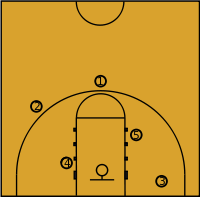Swingman
A swingman is an athlete capable of playing multiple positions in their sport.
Basketball
[edit]In basketball, the term “swingman” (a.k.a. “wing” or “guard-forward”) denotes a player who can play both the shooting guard (2) and small forward (3) positions, and in essence swing between the positions.[1][2]
Examples include:
- NBA players: Tracy McGrady, Vince Carter, Paul Pierce, Jimmy Butler, Michael Jordan, Kobe Bryant, Eddie Jones, DeMar DeRozan, Paul George, Andre Iguodala, Klay Thompson, Khris Middleton, LeBron James, Danny Green, Kevin Durant and Evan Turner
- WNBA players: Seimone Augustus, Maya Moore, Tamika Catchings, Angel McCoughtry, and Kaitlyn Davis
Baseball
[edit]In baseball, a swingman is a pitcher who can work either as a reliever or as a starter.[3] To thrive in this role, pitchers must possess the stamina of a starter as well as the flexibility to work out of the bullpen.[4] It may be difficult for swingmen to settle into the same type of routine as pitchers used exclusively in one role.[5]
History
[edit]In 19th century baseball, since the vast majority of games were finished by the starting pitcher, the swingman role did not exist. In the early 1900s, as the percentage of complete games fell, relief appearances became more common, and swingmen began to appear. Early examples included star pitchers such as Mordecai Brown and Ed Walsh (both in the Baseball Hall of Fame) as well as pioneers of the relief role such as Doc Crandall and Firpo Marberry.[4]
Through the 1930s, teams continued to use their best pitchers as both starters and relievers. Dizzy Dean, Lefty Grove, and (to a lesser extent) Carl Hubbell were all used as swingmen during this era.[6] In the 1950s and 1960s, strict starting rotations and specific roles for relief pitchers became standard; these trends reduced the prevalence of swingmen.[7] From 1970 through the present day, the usage of swingmen has continued to decline due to the increased specialization of pitchers.[8]
During this era, pitchers may be deployed as swingmen early in their careers to ease their transition to the major leagues, move to a permanent starting role once they are deemed ready, and transition back to a swingman/bullpen role as they decline with age, a career arc exemplified by Rudy May.[9] Swingmen are also valuable in the postseason, when they may be needed to replace a struggling starter early in a game and pitch multiple innings while keeping the score close.[10]
Other sports
[edit]Australian football
[edit]In Australian rules football, a swingman is typically a player who can play both in attack and in defence, usually as a key position player. Examples include Harry Taylor, Ryan Schoenmakers, Ben Reid and Jarryd Roughead.
Ice hockey
[edit]In ice hockey, a swingman is a player that could play both defenseman and forward, such as Brent Burns of the San Jose Sharks, Dustin Byfuglien of the Winnipeg Jets, Brendan Smith of the New York Rangers and Calder Cup Champion Paul Bissonnette.
See also
[edit]References
[edit]- ^ S. Trnini and D. Dizdar, System of the Performance Evaluation Criteria Weighted per Positions in the Basketball Game, 2000
- ^ "Every Position in Basketball, Explained". Nike.com. Nike. Retrieved May 29, 2024.
- ^ Dickson, Paul (1999). The New Dickson Baseball Dictionary: A Cyclopedic Reference to More Than 7,000 Words, Names, Phrases, and Slang Expressions that Define the Game, Its Heritage, Culture, and Variations. Houghton Mifflin Harcourt. p. 488. ISBN 978-0-15-600580-7. Retrieved 16 December 2021.
- ^ a b Treder, Steve (12 August 2008). "Superduperswingmen (Part 1: 1900-1930)". The Hardball Times. Fangraphs.com. Archived from the original on 23 October 2020. Retrieved 15 December 2021.
- ^ Bastian, Jordan (16 March 2019). "Life as a swingman: Be ready for anything". MLB.com. Archived from the original on 16 December 2021. Retrieved 15 December 2021.
- ^ Treder, Steve (2 September 2008). "Superduperswingmen (Part 2: 1930-1950)". The Hardball Times. Fangraphs.com. Archived from the original on 23 October 2020. Retrieved 16 December 2021.
- ^ Treder, Steve (23 September 2008). "Superduperswingmen (Part 3: 1950-1970)". The Hardball Times. Fangraphs.com. Archived from the original on 23 October 2020. Retrieved 16 December 2021.
- ^ Assouline, Julien (18 January 2017). "The Fall of the Swingman". Beyond the Box Score. SB Nation. Archived from the original on 12 November 2020. Retrieved 16 December 2021.
- ^ Treder, Steve (21 October 2008). "Superduperswingmen (Part 4: 1970-2008)". The Hardball Times. Fangraphs.com. Archived from the original on 23 October 2020. Retrieved 16 December 2021.
- ^ "Every MLB team should have a swingman pitcher". Pinstripe Alley. SB Nation. 17 April 2016. Archived from the original on 3 June 2020. Retrieved 16 December 2021.


